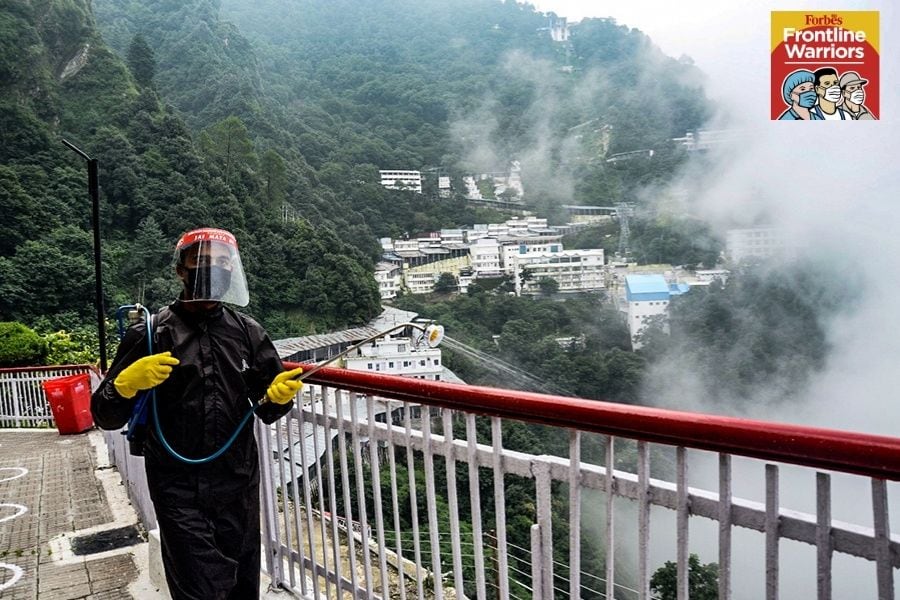How Jammu & Kashmir's largest hospital keeps Covid-19 toll down
Amid rising cases in the state, the Shri Mata Vaishno Devi Narayana Superspeciality Hospital saw only four Covid-19 related deaths in April


 A man disinfects the yatra trail in the Katra district, helping to maintain the strict Covid-19 protocols set in place
A man disinfects the yatra trail in the Katra district, helping to maintain the strict Covid-19 protocols set in place
Jammu & Kashmir is witnessing a sudden surge in coronavirus cases—from almost 40,000 last week to 50,000 this week. Amid these challenging times, there’s a silver lining. The Shri Mata Vaishno Devi Narayana Superspeciality Hospital, the largest hospital in the state in Katra district, has seen only four Covid-19 related deaths in April and one in March (as compared to 289 total deaths in April throughout J&K). Ramesh Kumar, the CEO of the Shri Mata Vaishno Devi shrine board and his team have been moving from pillar to post to ensure patients receive the best medical care.
The state believed the worst was over after the first wave of the coronavirus. This belief was reinforced as the hospital would get only one or two Covid-19 patients a day in January and February 2021. The spike in cases in March, however, with 200-300 callers per day, was unforeseen and it rang the warning bells for the hospital.
The demand for beds was high. The hospital has a capacity of 150 beds—110 reserved for Covid-19 patients 35 for non-Covid-19 patients and five for emergencies or trauma injuries. As a result, it could admit only 20 new patients a day, depending on the number of people discharged.
The three-floor hospital then devised a strategy to keep coronavirus cases under check. Of the three floors, two were kept only for Covid-19 patients and one for non-Covid-19 related cases, separated by a new wall. There were separate entries for these areas and the staff was instructed to work only in one of these sections to minimise the chances of transmission.
The hospital staff worked around-the-clock, procuring oxygen cylinders, verifying new patients, getting status updates and offering doctor consultations. Kumar had to work from home after his daughter tested positive for the coronavirus, but he didn’t let that come in the way of his duties.
The hospital is funded by the Shri Mata Devi Shrine board. Donations and offerings made by devotees go to the hospital. In case of supply or bed shortages, staff members note down the callers’ names and contact details. A doctor then calls the patients, and after understanding the symptoms, decides whether hospitalisation is required. To those who need home isolation and medicines, the hospital arranges regular check-ups and keeps updates on the patients’ vitals.
The continuous onslaught of new cases make treating patients a daunting task. “The main difficulty is the availability of oxygen, but the Jammu & Kashmir government is supporting us well," says Kumar. “Another difficulty is motivating our staff. They have long working hours and some of their families members are down with Covid-19… amidst all this, I try to keep their morale up and take care of the spiritual side." Despite some of the staff members having contracted the virus, leading to a manpower crunch, the others work with zeal and treat patients wholeheartedly.
Kumar and his team at the Shri Mata Devi Shrine board have also organised yatras, replete with Covid-19 protocol, in the Katra region. In March 2020, the initial yatra was suspended because of the lockdown. These yatras usually cater to 20,000 to 35,000 pilgrims per journey. After the onslaught of the second wave, this was slashed to 100 to 200 pilgrims at a time. The team regularly sanitises temples, ensures pilgrims have Covid-19 negative reports, arranges thermal scanning devices, and ensures masks are worn by all. Almost 3,000 employees are stationed along the 13-kilometre track, ensuring all protocols are followed.
“The cases in Jammu & Kashmir don’t seem to be stagnating… they are increasing. We hope that we will be able to take in more patients soon… we are in the process of getting more beds," says Kumar.
First Published: May 18, 2021, 09:37
Subscribe Now